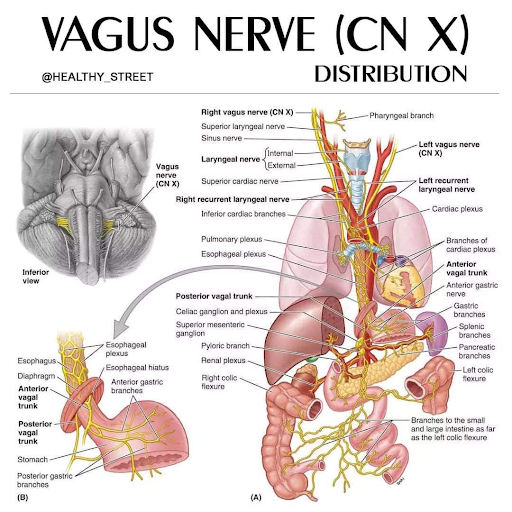What happens in Vegas stays in Vegas, right?
When it comes to the vagus nerve, wrong.
The vagus nerve is the longest cranial nerve in the body with numerous branches, named after the Latin term “wanderer.”
It’s connected to almost every process in the body, including the brain, digestive system, pancreas, heart, and lungs.
Luckily, we can perform vagus nerve exercises for digestion regulation, better sleep, and improved overall well-being.
But before we reveal how to regulate the vagus nerve, let’s more closely examine the role of this cranial nerve in our day-to-day functions.
What is the Vagus Nerve?
Our nervous system has a switch that allows us to either fight and flee from danger or rest and digest in the absence of it.
When we experience periods of high stress, our sympathetic nervous system pumps out epinephrine and norepinephrine to accelerate the heart rate and prepare the body to face a threat.
Adrenaline and cortisol rise, too.
However, many of us are stuck in a constant state of fight or flight even though we aren’t currently facing an inherently life-threatening situation.
Over time, these elevated stress hormones take their toll on the body and mind, causing chronic pain, anxiety, inflammation, and more.
During relaxation, the parasympathetic nervous system releases acetylcholine to slow our heart rate and prepare us for rest.
The vagus nerve is proven to serve as the switch between these two responses.
In fact, it’s connected to almost every function in the body, including heart rate, digestion, immune response, and sleep.
When our vagus nerve isn’t functioning properly, it’s often referred to as “low vagal tone.” This dysfunction is linked to irritable bowel syndrome, anxiety, and rheumatoid arthritis.
What’s more, the vagus nerve is partially connected to our feelings of love and care for others.
The Love Nerve, Explained
The vagus nerve becomes activated when we feel compassion and empathy for others.
This theory on the connection between the vagus nerve and our relationships with others was developed by Dr. Stephen Porges and is called “the Polyvagal Theory.”
Research has revealed that when shown images of suffering, participants’ vagus nerves became more active. In comparison, when shown prideful images, vagus nerve activity diminished.
Because of this, the vagus nerve is sometimes referred to as the “love nerve,” as it leads to loving and caring actions when activated.

Therefore, if your vagal tone is strong, you may be more kind and empathetic toward other people (and yourself) when needed.
When our vagus nerve is active, we feel safe and calm both physically and emotionally. When we feel safe, we can connect with others and offer support in challenging situations.
On the other hand, we may not be able to connect with others as easily if our vagus nerve isn’t functioning properly, as we aren’t feeling safe.
The good news is that we can regulate our vagus nerve - and when we do, better digestion, sleep, and physical and emotional well-being follow suit.
Poor Vagal Tone = Poor Digestion
Since our vagus nerve activates the parasympathetic nervous system, or “rest and digest” response, it’s no surprise that it helps us process our food.
The vagus nerve not only plays a role in the speed of our digestive system, it also sends signals from the gut to the brain.
Therefore, many theorize that improving vagal tone can help relieve digestive issues.

Our vagus nerve signals to the stomach to process the food within it, telling the stomach to produce the acid necessary to break down food.
Stomach acid also helps to defend the digestive system from bacteria, viruses, and parasites, so the vagus nerve’s role in signaling how much to produce is essential for good health.
Moreover, the vagus nerve signals to the muscles within the stomach to contract, pushing food into the small intestine for processing.
But that’s not all. The vagus nerve plays a role in enzymes produced by the pancreas that digest protein, fat, and carbohydrates.
It also helps to detoxify food while balancing blood sugar through glucose production.
While we sleep, our digestive system still remains active. Without adequate sleep, our digestive system becomes strained.
The function of our vagus nerve is directly correlated to the function and quality of our sleep.
The Vagus Nerve and Sleep
A third of adults don’t get enough sleep – and poor vagal tone may be to blame.
Aside from feeling “blah,” a lack of sleep is linked to dangerous health conditions like obesity, diabetes, high blood pressure, heart disease, stroke, anxiety, and even depression.
Moreover, you’re likely to be more irritable when sleep-deprived, which can hinder your professional and personal life.
The vagus nerve is closely tied to sleep quality, as it helps to balance the nervous system by promoting feelings of relaxation – a critical precursor to sleep.

When the vagus nerve is functioning as intended, it sends automatic signals to switch over from sympathetic to parasympathetic activity.
This slows our heart rate, leading to feelings of relaxation, calm, and (ultimately) sleep.
If your vagus nerve isn’t properly stimulated, you may have issues falling or staying asleep.
That’s where vagus nerve stimulation comes into play. Evidence supports that stimulating the vagus nerve dramatically improves sleep quality and overall well-being.
Luckily, we’ve gathered some quick ways to improve vagal tone with vagus nerve exercises for digestion, better sleep, and improved general health.
Stimulating the Vagus Nerve for Sleep and Digestive Health
As we’ve learned, the vagus nerve counterbalances our fight-or-flight response by triggering our relaxation response.
This central nerve regulates our emotions, digestion, sleep, and overall well-being. By stimulating it, we can better keep our bodies in equilibrium.
Techniques to stimulate the vagus nerve for sleep enhancement and better digestion include:
- Humming, singing, or gargling with water: activates the vocal cords and, in turn, the vagus nerve,
- Massage: gentle, firm touch activates our parasympathetic nervous system.
- Cold water immersion: research suggests that cold water immersion slows the heart rate and redirects blood flow to your brain, decreasing stress levels and activating the vagus nerve.
- Laughter: laughter lifts our spirits, boosts immunity, and stimulates our vagus nerve.
- Exercise: moving our body produces feel-good endorphins while activating our vagus nerve for boosted relaxation.
- Breathwork: breathing techniques, especially nasal breathing exercises, take the body out of fight or flight by activating our parasympathetic nervous system. Moreover, the nose produces nitric oxide, a vasodilator known to relieve stress.
Vagus nerve exercises for digestion and improved sleep quality can be practiced almost anywhere, anytime.
@somnifix McConaughey was onto something… 🎧🕺#greenscreen #greenscreenvideo #nitricoxide #vagusnerve #breathwork #humming #parasympatheticactivation #didyouknow #learnontiktok ♬ Mastermind - Taylor Swift
For example, humming along to music in the car or shifting your attention to your breath can make all the difference when it comes to shifting your nervous system into a restful state.
Habitual mouth breathing is known to cause over breathing, activating our fight or flight response and increasing anxiety.
Nasal breathing, however, improves vagal tone by shifting the body into a state of “rest and digest.”
By making sure you’re nasal breathing rather than mouth breathing, you’ll ensure that your vagal tone stays strong.
Take it one step further and nasal breathe during sleep to feel your best yet.
Tape Your Way to Better Vagal Tone
As we’ve learned, breathwork and nasal breathing offers a quick technique for vagus nerve activation.
If you mouth breathe often, as most of us do, shifting your breathing habits during waking hours is achievable. But what about while you’re asleep?
Mouth breathing during sleep places unnecessary stress on our system, disrupting sleep. What’s more, it causes airway tissues to fall backward and vibrate together, leading to snoring.
Snoring fragments sleep, causes poor oxygenation, and may even lead to sleep disorders over time.
Therefore, by putting an end to mouth breathing during sleep, you’ll put an end to vagus nerve deactivation caused by it.
So how do you nasal breathe during sleep if you’re not conscious? Tape your mouth shut before bed.

Yes, we’re serious! While it may seem like mouth taping leads to more stress, the opposite is true. By preventing mouth breathing, you’ll shift into nasal breathing and activate your vagus nerve for improved relaxation.
This promotes quality, snoreless sleep that will lead to your most refreshed mornings yet!
That said, not all tapes are created equal. Most tape isn’t skin safe, leading to irritation and rashes.
SomniFix, however, was designed as a skin-safe tool to prevent snoring, promote nasal breathing, and improve vagal tone as you rest.
Our strips even offer a patented central breathing vent if you’re concerned about becoming congested overnight, so you’ll rest easy with added peace of mind.
Tape your way to a toned vagus nerve for better sleep, digestion, and well-being with the help of SomniFix tonight






